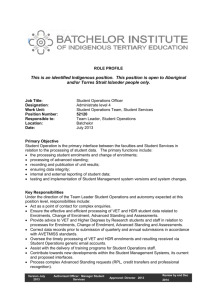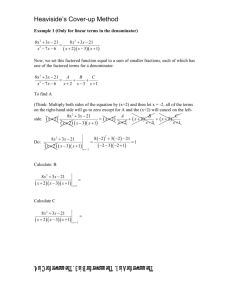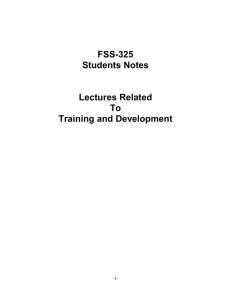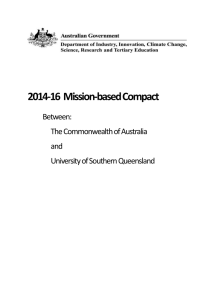University of Southern Queensland
advertisement
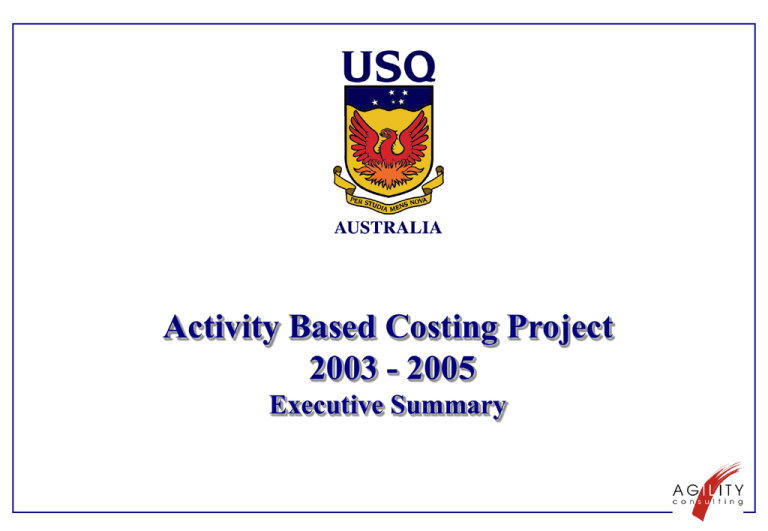
Activity Based Costing Project 2003 - 2005 Executive Summary USQ Student Enrolments 2004 USQ Delivery Channels Individual Off Campus Channel Distributed Learning Centre Channel On Campus Channel Individual Distributed Learning Centres On Campus Standard DE Primarily Online Wide Bay Toowoomba Springfield Off Shore On Shore 50% 4% 3% 23% 0% 17% 3% The Economic Denominator The Activity Based Costing Project sought to address the question: “What drives USQ’s Economic Engine?” “The Hedgehog Concept” – Collins, 2001. What are you deeply passionate about? What you can be the best in the world at? What drives your economic engine? What is the economic denominator (profit per x or, in the social sector, cash flow per x) which has the single greatest impact on moving the organisation “From Good to Great”? Methodology ABC attempts to link the inputs of the University (people, premises, technology and consumables) with the outputs teaching courses and programs and research. A typical cost architecture and model data sources are shown below. RESOURCES ACTIVITIES Faculties Payroll System Academic Support Administration Support Time Surveys COST OBJECTS Delivery Modes Preparing Lectures Timetabling Courses Preparing Lectures System PreparingLectures Lectures Preparing ACC 1100 Preparing Lectures Delivering Lectures DeliveringLectures Lectures Delivering SCC1123 Delivering Lectures Delivering Lectures AssessingStudents Students Student Assessing Students Assessing Students Assessing Students Records Assessing Students International System Onshore Liaising with Students Supporting Student Marketing Research Support Floorspace / Timetabling Systems Facilities Financial Systems Domestic HECS Researching Enrolling Students Library Finance, IT, HR International Offshore Providing Library Services Providing Corporate Services Domestic Fee Paying Research Grants Business Sustaining Publications Leadership Strategy HRD Completions Govern Compliance Programs B. Bus B. Sc B. Arts M. Bus M. Sc M. IB Model Demonstration Resource Costs are assigned to Activities based on statistical drivers. The cost of Academic Salaries, for example, is assigned to activities based on Salary Weighted Time Survey results as shown below. 2003 Results: Course Contribution Cliff The USQ cumulative “Course Contribution Cliff” is shown below. The courses on the left are the most profitable with the courses on the right being the least profitable. 30 25 $10M in value is eroded by 200 courses 20 $M 15 10 5 0 537 Courses 528 Courses 2003 Results by Faculty The contribution from teaching from each of the Faculties is shown below. The size of the bubble represents the number of enrolments. Faculties below the x-axis are providing a negative contribution. 8 Contribution Margin = 15% Contribution ($M) 6 Faculty of Arts Faculty of Business 4 Faculty of Education Faculty of Engineering and Surveying Faculty of Sciences 2 0 0 10 20 30 40 Key: -2 Revenue ($M) 2,000 Enrolments 20,000 Enrolments 2003 Results by Delivery Mode The contribution from teaching from each of the modes is shown below. The size of the Bubble represents the number of enrolments. Modes below the x-axis are providing a negative contribution. 12 Contribution ($M) 8 Contribution Margin = 15% 4 0 (20) 0 20 40 60 Educational Partners - Off Shore Educational Partners - On Shore Off Campus - On-Line Off Campus - Standard On Campus - Toowoomba On Campus - Wide Bay -4 Key: -8 Revenue ($M) 2,000 Enrolments 20,000 Enrolments 2003 Results by Educational Partner Educational partner results are shown below. The size of the bubble represents the number of enrolments. Partners below the x-axis are providing a negative contribution. Target Contribution Margin - 15% 20% 400 10% 300 Contribution ($000) 200 100 0 (500) Break Even 0 500 1,000 1,500 2,000 2,500 3,000 (100) Bretten Canterbury Informatics - Malaysia Informatics - Singapore Kangda College SALO Segi Group STI - Shanghai STI - Taiwan ZUCC Other (200) 45 Partners (300) (10%) Key: (400) (500) (40%) Revenue ($000) (30%) (20%) 250 Enrolments 2000 Enrolments Note: Construction of this level of detail from the ABC Model result requires further analysis outside of the model. Performance Management The Economic Denominator For USQ the economic denominator is the “Course Contribution Margin” Department Contribution Course contribution targets will be set for each Faculty/ Department Course Level Management A framework is being developed to address possible course /program rationalization Performance Management (cont’d) Educational Partners USQ has changed its Learning Management System for online delivery and is now investigating an open source/open standards based approach An Educational Partner Model is being developed addressing such issues as: • Pricing model; • Standard Contract; and • “Partner non-performance” escape clauses The Economic Denominator The University is in the process of setting targets for all output groups (Teaching, Research, Commercial, Community, etc). University Example Total Revenue $130M Revenue from Teaching $110M Return @ 5% = Net Profit Add: Investment in Research Add: Strategic Projects Required Contribution From Teaching $6M $10M $8M $24M Baseline Teaching Margin = 22% (24/110 100) Course contribution is the Economic Denominator. Well structured programs with a reasonable sized student cohort deliver a 30% - 40% Contribution Margin The Economic Denominator With course contribution as the economic denominator, USQ is committed to reducing the number of courses which provide a negative contribution, thus “Trimming the Tail off the Whale”. 30 25 20 $M 15 10 5 0 537 Courses 528 Courses Model Utilisation and Enhancement •The Activity Based Costing Model is a journey, not a destination •Current enhancements include: Calculating program contribution; Deployment of model reporting and analysis; Data collection of time surveys online •Data is to be refreshed annually •The use of the ABC Model for budgetary allocation purposes is via the Budget Management Committee, which is chaired by the VC

